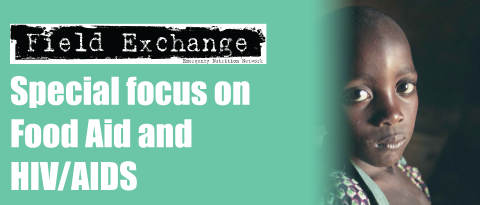UN Draft Guidance on Programming
UNHCR and WFP have developed draft practical guidance on implementing programmes that incorporate both HIV/AIDS and food security/nutrition activities. The material is targeted at managerial and technical staff of the UN and cooperating partner agencies. The premise of the guidance is that as refugees often depend, at least in part, on external assistance for nutritional, health and other basic needs, refugee settings provide unique opportunities to implement tailored interventions that mitigate the effects of the illness and prevent HIV transmission - thus addressing the vicious cycle of HIV/AIDs and food insecurity.
The document describes two types of integrated programme strategies. Strategies described in Chapter 3 incorporate HIV/AIDS prevention, care, treatment and support activities into food and nutrition programmes. Strategies presented in Chapter 4 incorporate food and nutrition training, or use food resources for capacitybuilding and/or institutional support activities in HIV/AIDS programmes. The document clearly states that it is not always true that programme strategies across sectors should always be multi-sectoral. Food and nutrition programmes are not a 'magic bullet' for preventing HIV transmission or mitigating the effects of the HIV/AIDS pandemic. Additionally, it is vital to avoid overreliance on food programmes, which could disrupt agricultural production and markets in refugee communities. Agency staff should identify interagency and inter-sectoral linkages that make sense in the local context.
The draft guidance documents state that the decision to implement one or more of these integrated programme strategies should follow from a local assessment, preferably conducted in both the refugee and host communities. Across refugee settings, the epidemiology of HIV/AIDS varies widely, with some populations exhibiting a low HIV prevalence, except in defined highrisk groups, while others struggle with a more generalised epidemic. HIV epidemics may also be associated with different patterns of food and nutritional insecurity among vulnerable groups. Assessment and analysis of food security and malnutrition in affected populations are essential in deciding whether food-based programmes are appropriate in the context of HIV/AIDS. Initial HIV prevalence rates and the nature of refugee-host interactions can be significant determinants of HIV risk in both populations. The document describes many examples of agency field staff drawing on refugee and host community skills (e.g. music, dance and drama, teaching, training and peer education skills) to build more community-driven refugee health programmes to prevent HIV transmission and provide medical, health, nutrition and livelihood support to the HIV/AIDS-affected.
Finally, the document stresses that implementation of integrated programme strategies should be accompanied by rigorous monitoring and evaluation of both process and outcome indicators. Pilot-testing and evaluation will provide valuable data on the effectiveness of these activities.
For further information contact Paul Spiegel at email: SPIEGEL@unhcr.ch
Imported from FEX website


